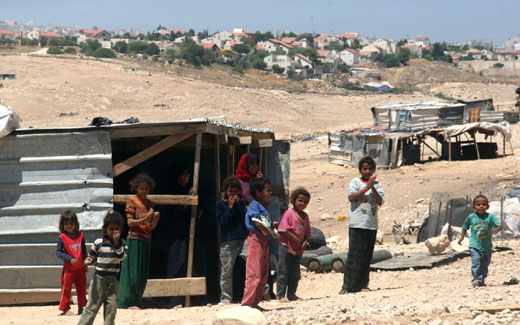UPDATES
Relocation of Bedouin misrepresented by Sherwood
December 7, 2011 | Sharyn Mittelman

Today both the Age and Sydney Morning Herald published an article by Harriet Sherwood regarding Israel’s plans to relocate the Jahalin Bedouin from their camps on land which they do not own to a permanent Bedouin town.
The article, originally published in the Guardian does not provide a balanced understanding of the issues at hand. The Bedouin are living on land to which they have no legal title that has been within the municipal boundaries of Ma’aleh Adumim since 1977. Relocation has been periodically discussed with the Bedouin since the 1980s.
As Haaretz‘s Amira Haas, an Israeli journalist known for being highly critical of her own government, reported in September, the Israeli plan is to give the Jahalin Bedouin leases in a permanent village near where they now live and significant financial compensation.
As Haas reports, the controversy is not so much about whether the Bedouin should be relocated as Sherwood implies but that the Bedouin would like to “be involved in the conditions of the site to which they will be evacuated”. The Bedouin were against moving to the Bedouin village proposed because it was near the Abu Dis garbage site. However, the Bedouin had previously agreed to move to the Tabaq el Qteyf area, about three kilometres east of the settlement of Kedar.
According to Haaretz, in response the Israeli Coordinator of Government Activities in the Territories stated that:
“as part of the attempts to find a solution for the Bedouin population in Judea and Samaria, a number of alternatives are being examined, with the aim of improving the quality of life for the entire population of Area C, building proper infrastructure, and communicating with the tribes.”
In addition, the Coordinator of Government Activities in the Territories stated that alternatives to the current site are being considered by Israel in consultation with the Bedouin:
“the process of assessing the alternatives is still underway, and when conditions are ripe, a procedure of deliberation with the tribe leaders will be embarked on.”
Sherwood’s article is not only biased but also wrongly suggests that relocating Bedouin undermines the viability of a Palestinian state. She quotes a Palestinian who said:
“They want to empty the Bedouin from the whole area and they will put settlers in our place and there will be no Palestinian state”.
However, the issue of expanding Ma’aleh Adumim within its already established municipal borders does not undermine the prospect of Palestinian statehood, particularly given that Ma’aleh Adumim is situated close to Jerusalem and is almost certain to remain part of Israel in any conceivable two state solution.
In addition, it is interesting to note that the Age and Sydney Morning Herald rightly did not include Sherwood’s more inflammatory comments that were published in the Guardian. In the Guardian the article included the following:
“The tiny communities perched on the bleak rocky hills which roll down towards the Dead Sea endure a harsh existence without electricity, running water, sanitation, paved roads and medical facilities. The Bedouin homes are makeshift structures of wood, corrugated iron and tarpaulin. The nearby Jewish settlements, in contrast, are connected to utilities and services. Ma’ale Adumim, home to almost 40,000 people and which overlooks the Jahalin communities, has 21 schools, 80 kindergartens, a public transport network, libraries, swimming pools and shopping malls.”
What Sherwood conveniently fails to mention is that many Bedouins are being relocated to permanent Bedouin towns precisely in order to provide them with better sanitation, electricity and water. The issue of relocating Bedouin is fraught with difficulties given that many Bedouin prefer to live a nomadic life style outside of urban areas. Transitioning into modern society requires to an extent relinquishing values and customs that were part of a Bedouin society when it was nomadic. It is also worth noting that the establishment of permanent Bedouin towns did not begin until the Bedouin themselves constructed buildings to replace traditional tents.
In addition, Israel largely has a positive relationship with its own Bedouin communities. A comparison of the Bedouin in Israel to that in Arab counties shows that Bedouin in Israel have better living conditions particularly in the areas of social welfare and land ownership.
Tags: Israel





